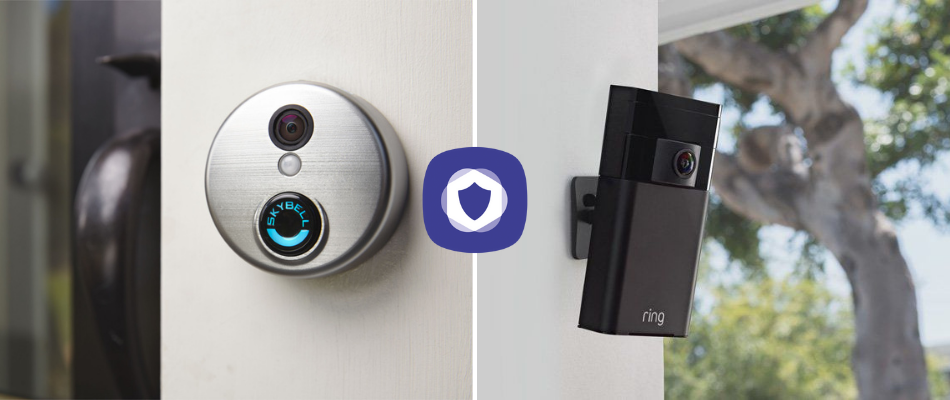Both Ring and SkyBell are leaders in the smart doorbell space, establishing themselves as solid choices for consumers who want to increase their front-door security. These video doorbells are user-friendly and can be easily installed by most consumers. Both companies’ doorbells use apps to alert users when someone is near their front door and allow customers to stream live footage so they can see what’s happening. Both companies are known for providing solid, user-friendly products, but Ring edges SkyBell out with more product offerings and installation and monitoring options for consumers.
Ring, originally named Doorbot, was founded in 2013 and is headquartered in Santa Monica, Calif. While the company launched with a smart doorbell, the company has since expanded and now offers a whole slew of home security products. In February 2018, Amazon acquired Ring.
SkyBell was also founded in 2013, but is still predominantly in the doorbell camera space and hasn’t expanded its product line into other home security offerings. It’s a privately held company, headquartered in Irvine, Calif.
Here, we compare Ring vs. SkyBell doorbell cameras. We’ll look at their similarities, differences, and, ultimately, which one may be the best choice for your home.
SkyBell and Ring: What do they have in common?
The doorbell cameras offered by SkyBell and Ring have quite a bit in common, including the following features:
- Live monitoring: Both companies offer live views of your property, which are available via an app on your phone 24/7.
- Two-way talk: Both brands’ products allow users to hear and speak with people in the vicinity of the doorbell camera.
- Installation: Both SkyBell and Ring video doorbells require DIY installation.
- No contracts: Neither Ring or SkyBell requires that you sign a long-term contract. You can sign up for Ring’s professional monitoring for a monthly fee, but you can cancel at any time.
SkyBell and Ring: What are the differences?
While both companies’ offerings are similar in many respects, there are some differences that may help you make your decision.
- Wired vs. wireless installation: Both SkyBell models are made to replace your existing doorbell and must be hardwired. On the other hand, most Ring doorbells are battery operated and can be mounted anywhere, though they do offer a few hardwired options as well.
- Professional monitoring vs. self monitoring: While both Ring and SkyBell can be self-monitored, only Ring offers the option of professional monitoring, which offers extra reassurance that the authorities will be called in case of an emergency.
- Price and options: SkyBell only offers two models, both of which are $199. Ring offers a broader range of choices, with models as low as $99.99 and as high as $349.99.
- Free cloud recording vs. paid plan: SkyBell wins when it comes to video recording, as it will store video footage for up to 7 days in the cloud for free. Cloud storage for Ring is $3 per month or $30 per year for one device.
- Customer service: Ring offers customer service 24/7, while SkyBell support is available during limited hours (7 a.m. to 5 p.m. PST Monday through Friday and 8 a.m. to 2 p.m. PST Saturdays).
SkyBell Video Doorbells: What you need to know
SkyBell offers solid products that are known for being well-made and dependable, both of which are available for just under $200. They have a sleek, modern look and offer a host of useful features to help keep homes safe. However, the company doesn’t offer professional monitoring or security equipment beyond its video doorbells and a few accessories.
SkyBell Pros
- Live video feed and alerts: Any time you want to see what’s happening at your door, you can see it in real-time via an app on your phone. You’ll also receive alerts when it senses someone near your door.
- No monthly contract: Once you pay for the equipment, there are no ongoing costs, and you’re not locked into a long-term contract.
- Free video storage: SkyBell offers seven days of free video storage, whereas you must pay for any storage with most other doorbell cameras. If you want to save any videos for longer than seven days, you can easily download them to your phone.
- No long-term contracts: There are no long-term contracts to sign with SkyBell. Once you pay for the equipment, you own it outright and can self-monitor at no cost.
SkyBell Cons
- No professional monitoring: Professional monitoring offers an extra level of security, and it isn’t offered by SkyBell.
- App issues: The SkyBell app in both Google Play and the Apple store gets low marks: 2.4 and 2.1 out of 5 stars, respectively. Users report numerous glitches, lags in video and other technical issues. The app is reportedly being updated.
- Limited options: SkyBell only has two models from which to choose. While both are solid options, if you’re looking for a variety of choices, you won’t find that with SkyBell.
Check out our full SkyBell review
Ring Video Doorbells: What you need to know
Ring has long been a leader in the front-door security arena, starting with its innovative doorbell camera and following with an array of other home security products. The company, which is now owned by Amazon, has established a solid reputation for producing dependable, innovative, user-friendly home security products.
Ring Pros
- User-friendly: Ring doorbells are easy for users to install themselves, as most models require no hardwiring. When battery-operated, they can be mounted anywhere and easily moved. They do offer a couple of hard-wired models as well, and those are simple to install if you’re comfortable connecting wiring.
- Affordable: Ring offers a variety of doorbells cameras in a wide range of price points, with basic models starting at just $99.
- No long-term contracts: There are no long-term contracts to sign with Ring. Once you pay for the equipment, you own it outright and can self-monitor at no cost.
- Professional monitoring available: With Ring, you have the option of adding 24/7 professional monitoring. It costs $10 per month after a free 30-day trial and can be cancelled at any time.
Ring Cons
- No professional installation: If the letters DIY strike fear in your heart, Ring isn’t the solution for you. Installation is simple, with no hardwiring required for most models, but if you want someone to do the job for you, you’ll have to find and hire your own pro as Ring doesn’t offer the service.
- No free cloud storage: While you can view live footage 24/7, if you want to keep the recordings to view later, you’ll have to pay for a storage plan.
Read more in our full Ring Cameras review
SkyBell vs. Ring: The bottom line
If you’re looking to increase security at your front door, then you can’t go wrong with either Ring or SkyBell. They both produce reliable, affordable, user-friendly video doorbells to help keep your home safe and secure. Our Nerd nod, however, goes to Ring because it offers more choices when it comes to doorbell styles, including wireless and hardwired options, as well as the option of professional monitoring. Ring also produces a whole line of other home security products, including the Ring Alarm Security System, so you can easily cover the security needs of your entire home with one company.
Get a Ring Doorbell Get a SkyBell
As an Amazon Associate we earn from qualifying purchases. Participation in these programs helps us keep the site up, and to continue to help you find great products. Our editorial process is in no way impacted by partnerships.
This article has been reviewed and approved by Officer Banta.

Officer Banta is the official SecurityNerd home security and safety expert. A member of the Biloxi Police Department for over 24 years, Officer Banta reviews all articles before lending his stamp of approval. Click here for more information on Officer Banta and the rest of our team.

